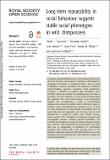Files in this item
Long-term repeatability in social behaviour suggests stable social phenotypes in wild chimpanzees
Item metadata
| dc.contributor.author | Tkaczynski, Patrick J | |
| dc.contributor.author | Mielke, Alexander | |
| dc.contributor.author | Samuni, Liran | |
| dc.contributor.author | Preis, Anna | |
| dc.contributor.author | Wittig, Roman M | |
| dc.contributor.author | Crockford, Catherine | |
| dc.date.accessioned | 2021-11-30T11:30:15Z | |
| dc.date.available | 2021-11-30T11:30:15Z | |
| dc.date.issued | 2020-08-12 | |
| dc.identifier | 276614194 | |
| dc.identifier | 11bddd54-dcb9-4067-a93f-70cf29f03d0a | |
| dc.identifier | 85092658412 | |
| dc.identifier | 32968512 | |
| dc.identifier.citation | Tkaczynski , P J , Mielke , A , Samuni , L , Preis , A , Wittig , R M & Crockford , C 2020 , ' Long-term repeatability in social behaviour suggests stable social phenotypes in wild chimpanzees ' , Royal Society Open Science , vol. 7 , no. 8 , 200454 . https://doi.org/10.1098/rsos.200454 | en |
| dc.identifier.issn | 2054-5703 | |
| dc.identifier.other | Bibtex: tkaczynski2020long | |
| dc.identifier.uri | https://hdl.handle.net/10023/24438 | |
| dc.description | Core funding for the Taï Chimpanzee Project is provided by the Max Planck Society since 1997. P.J.T., C.C. and R.M.W. were supported by the European Research Council (ERC; grant agreement no. 679787). L.S. was supported by the Minerva Foundation. A.P. was supported by the Leakey Foundation. A.M. was supported by the Wenner-Gren Foundation and a British Academy Newton International Fellowship. | en |
| dc.description.abstract | Consistent individual differences in social phenotypes have been observed in many animal species. Changes in demographics, dominance hierarchies or ecological factors, such as food availability or disease prevalence, are expected to influence decision-making processes regarding social interactions. Therefore, it should be expected that individuals show flexibility rather than stability in social behaviour over time to maximize the fitness benefits of social living. Understanding the processes that create and maintain social phenotypes requires data encompassing a range of socioecological settings and variation in intrinsic state or life-history stage or strategy. Using observational data spanning up to 19 years for some individuals, we demonstrate that multiple types of social behaviour are repeatable over the long term in wild chimpanzees, a long-lived species with complex fission–fusion societies. We controlled for temporal, ecological and demographic changes, limiting pseudo-repeatability. We conclude that chimpanzees living in natural ecological settings have relatively stable long-term social phenotypes over years that may be independent of life-history or reproductive strategies. Our results add to the growing body of the literature suggesting consistent individual differences in social tendencies are more likely the rule rather than the exception in group-living animals. | |
| dc.format.extent | 17 | |
| dc.format.extent | 1115438 | |
| dc.language.iso | eng | |
| dc.relation.ispartof | Royal Society Open Science | en |
| dc.subject | Personality | en |
| dc.subject | Sociality | en |
| dc.subject | Flexibility | en |
| dc.subject | Plasticity | en |
| dc.subject | Primate | en |
| dc.subject | BF Psychology | en |
| dc.subject | DAS | en |
| dc.subject.lcc | BF | en |
| dc.title | Long-term repeatability in social behaviour suggests stable social phenotypes in wild chimpanzees | en |
| dc.type | Journal article | en |
| dc.contributor.institution | University of St Andrews. School of Psychology and Neuroscience | en |
| dc.identifier.doi | 10.1098/rsos.200454 | |
| dc.description.status | Peer reviewed | en |
This item appears in the following Collection(s)
Items in the St Andrews Research Repository are protected by copyright, with all rights reserved, unless otherwise indicated.

